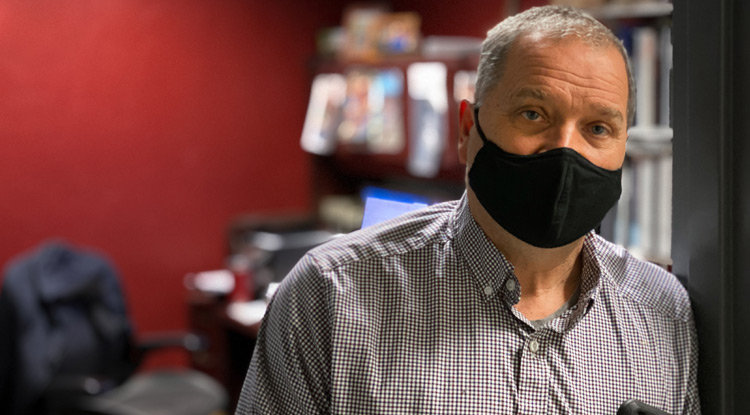 Larry Miller is not a student at IUP; however, his assignment is clear. “I'm learning about this virus and how to fight it every day,” he said. “My goal is to be transparent and give anyone who steps on this campus a feeling of safety. None of what we're doing is top secret.”
Larry Miller is not a student at IUP; however, his assignment is clear. “I'm learning about this virus and how to fight it every day,” he said. “My goal is to be transparent and give anyone who steps on this campus a feeling of safety. None of what we're doing is top secret.”
As IUP's director of Facilities Maintenance and Operations, Miller spends sleepless nights cramming for what is probably the biggest test of his 25-year career at IUP. A test he takes every day when he sits down at his desk in the Robertshaw building and starts to disseminate all he's learned while overseeing the monumental task of decontaminating IUP's academic buildings, residence halls, offices, and performance spaces. Miller is constantly studying and learning how to rid facilities of the COVID-19 virus, particularly in areas where students, faculty, and staff gather. That includes researching, purchasing, and implementing equipment to sanitize the air we breathe, understanding the most effective ways to clean surfaces (how long does the spray need to stay on a chair, door, or keyboard?), and learning which chemicals to use on high-touch areas.
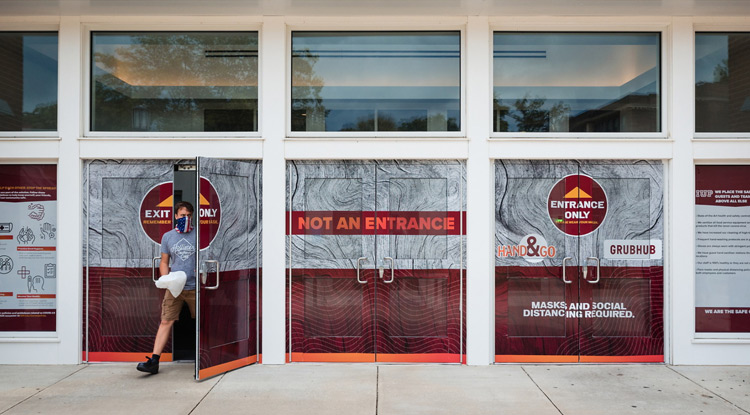
At North Dining, window decals guide students on where to enter and exit to maintain a safe distance from others.
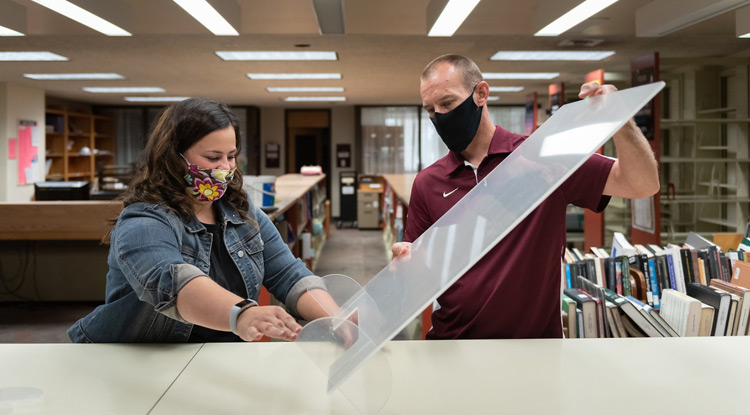
Vanessa Yingling and Bob Zack assembled a plexiglass divider to promote safety in the IUP Libraries.
“My hope is to give people a comfort level that they're going to be safer on our campus than they would be in any store or business,” Miller said. “Parents should know their IUP student is surrounded by a team of people working hard and learning every day to prevent this virus from ever reaching their child while they are in our buildings.”
Some of the fight happens in spaces invisible to students and employees. For example, efforts have included installing ultraviolet lights inside fixtures. Air passes through a HEPA (high efficiency particulate air) filter, hits a UV light, and is cleaned of contaminants and pushed back into the room or hallway. The technology was installed inside small light fixtures in high-traffic buildings like Cogswell Hall and in air handlers to treat entire buildings, including residence halls and University Towers, where the campus police operate.
An autonomous, robotic floor scrubber with ultraviolet technology makes its way across the Memorial Field House gymnasium.
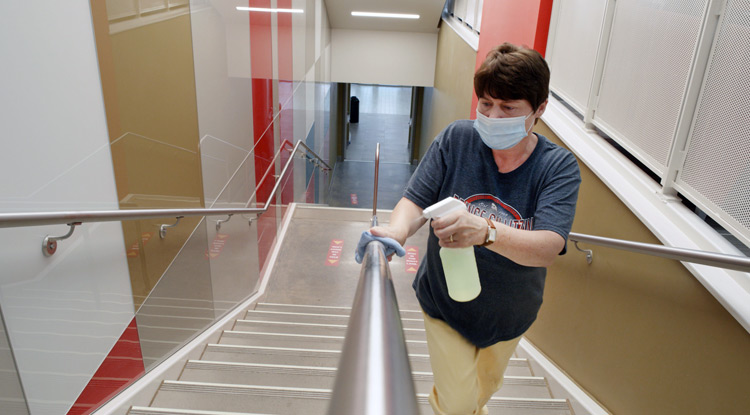
Teresa Jula disinfected surfaces inside the College of Humanities and Social Sciences building.
More visible are the electrostatic sprayers used inside Delaney Hall, where students who test positive for COVID-19 are quarantining. Custodians use handheld and sometimes backpack sprayers to treat rooms after they are vacated. There are also portable air cleaning units inside the IUP Health Service. Staff members can wheel the unit into a room, run it for 30 minutes, and feel safe to use the room again. In Zink Hall, Memorial Field House, and the Kovalchick Complex, autonomous, robotic scrubbers scrubbers resembling shrunken Zambonis use UV light to disinfect floors where teams practice.
Other Facilities team members who are carrying out the fight against COVID-19 include the Central Stores and Engineering and Construction staffs, plumbers, custodians, electricians, and heating, ventilation, and air conditioning personnel, among others. A typical day could include restocking, maintenance, delivery, or installation of various products that help tackle the virus.
For example, team members may need to
- learn the proper application and use of chlorinated tablets and high-dose hydrogen peroxide in electrostatic sprayers,
- order and deliver supplies and restock health kits (containing masks, hand sanitizer, and cleaning wipes) stationed in every classroom on campus,
- convert water fountains to touchless bottle-filling stations,
- replace hand-sanitizing products with those that have touchless applicators,
- install and maintain Meeting Owl cameras (the campus has 115)—a joint effort with IT Services that allows faculty members to teach in a classroom while students are remote,
- install branded signage, decals, and posters emphasizing the need to maintain an appropriate distance from others,
- implement and maintain a water flushing schedule in all buildings because of low water usage, or
- update policies for the university community on best practices and current trends in fighting the virus.
Miller and his Facilities team have been taking final exams every day since March 2020. He says there's no way IUP will fail this test.
“I couldn't have fathomed the things I would need to know,” Miller said. “Debra [Fitzsimons], our vice president; my [associate vice president], Sam Phillips; and colleagues in the Administration and Finance Division have really gone above and beyond to support this effort. Proactive leadership and timely decision making, along with funding support, keep us ahead of the curve as we try to maintain a safe campus environment for students, faculty, and staff.”
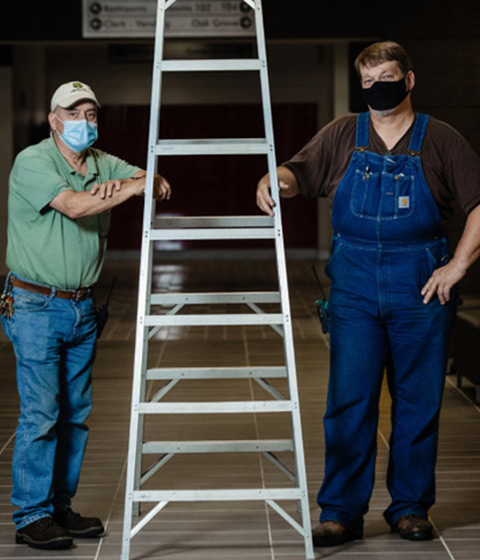
Barry Haldin, left, and Ed Buterbaugh after installing Meeting Owl technology inside College of Humanities and Social Sciences building classrooms
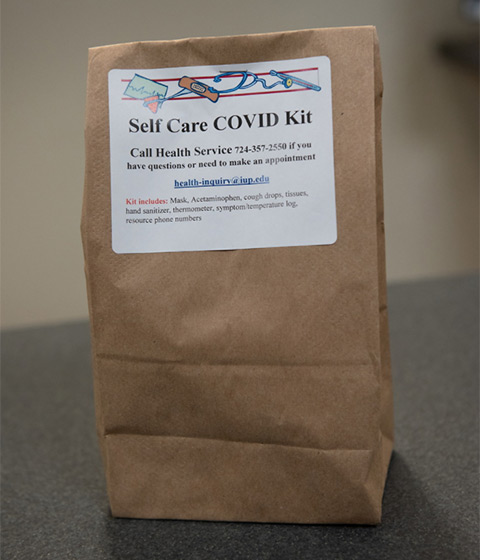
Thousands of safety kits were assembled